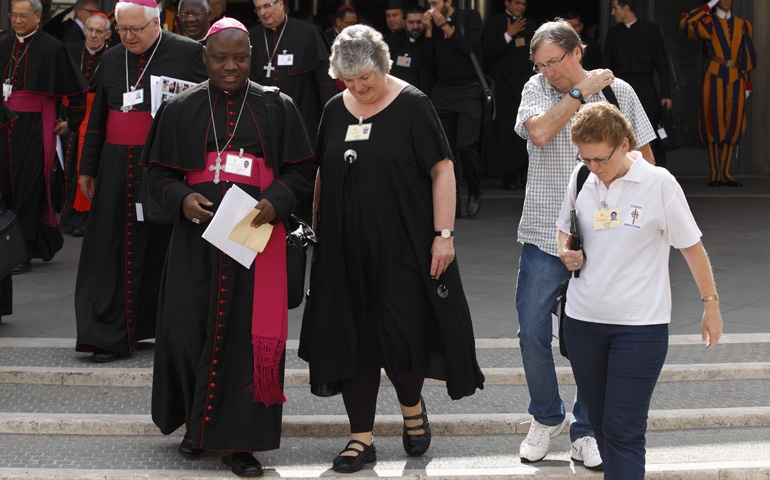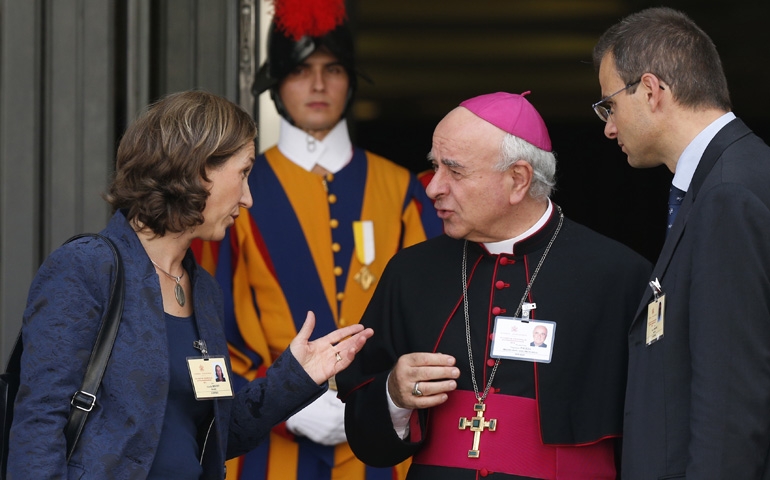Among First Synod Discussions: Changing Harsh Language, Trying "Graduality"
By Joshua J. McElwee
The first days of discussions at the global meeting of Catholic bishops have focused partly on how to change "harsh language" used by the church in discussing family life and on acknowledging that people grow in faith slowly, according to Vatican observers of the meeting. One theme said to be included in 70 speeches made by prelates over the past two days is how the prelates label people with words that "are not necessarily words that invite people to draw closer to the church." Briefing reporters Tuesday on the event, known as a Synod of Bishops, Basilian Fr. Thomas Rosica said one or more synod members specifically referred to three terms commonly used by the church: "Living in sin": a reference to couples who live together before marriage; "Intrinsically disordered": a reference to gay people; and "Contraceptive mentality": a reference made by some prelates to refer to a society that does not respect life. "To label people ... does not help in bringing people to Christ," said Rosica, summarizing the synod member. "There was a great desire that our language has to change in order to meet the very difficult situations." Rosica spoke Tuesday during a Vatican briefing summarizing the talks at the Oct. 5-19 synod. Unlike previous synods, the Vatican is not releasing texts or summaries of the some 190 prelates' talks but is instead providing daily briefings with three spokesmen who are attending the synod and summarizing events: official Vatican spokesman Jesuit Fr. Federico Lombardi, in Italian; Chicago archdiocesan Fr. Manuel Dorantes, in Spanish; and Rosica, in English. Joining the spokesmen Tuesday were also two synod members: English Cardinal Vincent Nichols and Cardinal Bechara Boutros al-Rahi, the Maronite Patriarch of Antioch. Nichols said one recurring theme so far is the theological notion of "graduality," meaning that Catholics may sometimes grow toward adherence or understanding of church teaching throughout their lives. "It's a law of pastoral moral theology which permits and encourages people, all of us, to take one step at a time in our search for holiness in our lives," Nichols said. "There is a pathway by which we all walk, and I think some of the foundations for the development of that notion have been mentioned already in the first days" of the synod, he said. At the same time, Nichols said Catholics looking for concrete changes to come from the synod need to wait for the meeting to continue first. "There's a lot of ideas being put forward -- a lot of concerns -- and I think we have to be patient and let this process mature," he said. Referring to Francis' speech to the group Monday morning, in which the pontiff asked the prelates to "speak boldly and listen with humility," Nichols said, "He's saying to us, be patient, let the picture emerge gradually." "And I think you have to be the same," the cardinal said, referring to press questions about what the synod might result in. Giving an overview of the synod talks so far, Lombardi said Tuesday that 70 synod members had spoken in the sessions held through Tuesday morning. Lombardi, Rosica and Dorantes each gave a separate list of themes they observed during the discussions. Rosica presented 11 separate themes -- including the process of the synod itself, the notion of "graduality," the "virtue of hope," "creative programs" for pastoral practice, and how marriage theology relates to Trinitarian theology. But, contradicting reports that the synod may result in changes of certain church doctrines, Rosica said: "There was no language whatsoever of a need to change doctrine but to repurpose what we know in a way that's accessible" to all. "I didn't hear anything about changing doctrine, but I heard a great desire to deepen our understanding of doctrine," he said later. The bishops are opening each of their meetings Monday afternoon through Thursday evening with announcement of the theme for that session, followed by a testimony by a married couple on the theme. Responding to an NCR question about Monday afternoon's testimony -- in which an Australian couple spoke frankly about their sex lives and said it was "extremely hard to appreciate the beauty" of church teachings prohibiting contraception -- Nichols said couples' sex lives was "not what we bishops talk about generally." "To hear that as the opening contribution did, I think, open up an area which other people did follow, and it was a recognition that that was essential to the well-being of a marriage," he said. "And it's a central point of which the experience of God's love and experience can be experienced and shared. So it did make a difference." "How did we respond? Very warmly with applause," he said. Nichols also said discussions in the synod hall so far have had a "very lovely spirit." "There is a lightness of atmosphere, which I think does enable people to speak much more from their pastoral experience ... than from their academic study," he said. The bishops' work during the synod continues Tuesday afternoon. Approximately 190 prelates are at the synod and will be able to vote in the discussions. Some 60 others, mainly non-prelates, have been selected in other roles and are able to contribute to discussions but not to vote. After one week of meetings, the bishops will create a draft of a working document for the synod that will then be worked on during the second week of meetings, resulting in a final document for the synod that will be delivered to the pope. Among those who gave pre-written addresses during Monday's afternoon sessions: Washington Cardinal Donald Wuerl, former Vatican Secretary of State Cardinal Angelo Sodano, German Cardinal Walter Kasper, Philippine Cardinal Luis Tagle, and Austrian Cardinal Christoph Schonborn. Included in those who gave "free" remarks Monday afternoon: French Cardinal Andre Vingt-Trois, Brazilian Cardinal Odilo Scherer, Brazilian Cardinal Joao Braz de Aviz, Ghanaian Cardinal Peter Turkson, and Nichols. [Joshua J. McElwee is NCR Vatican correspondent. His email address is jmcelwee@ncronline.org. Follow him on Twitter: @joshjmac.]
|
.
Any original material on these pages is copyright © BishopAccountability.org 2004. Reproduce freely with attribution.

